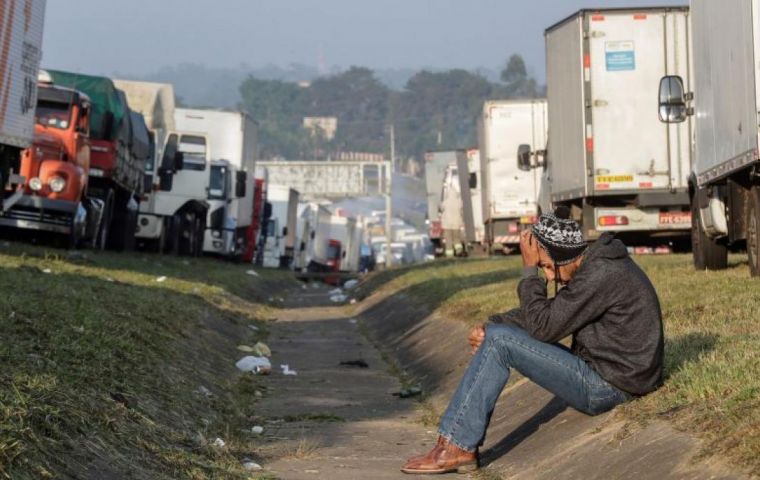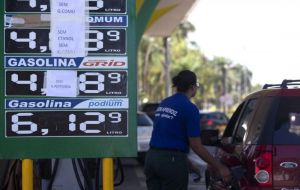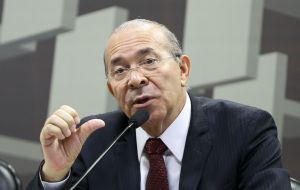MercoPress. South Atlantic News Agency
Brazil truckers strike: Government says a 15-day truce had been reached
 Brazil's economy runs largely on road transport and the strike to protest rising diesel prices was beginning to have serious consequences
Brazil's economy runs largely on road transport and the strike to protest rising diesel prices was beginning to have serious consequences  Long lines formed at gas stations, and some ran out of some kinds of fuel. In Rio de Janeiro, only about two-thirds of the city's buses were running on Thursday
Long lines formed at gas stations, and some ran out of some kinds of fuel. In Rio de Janeiro, only about two-thirds of the city's buses were running on Thursday  Chief of staff Eliseu Padilha told reporters several unions that represent truckers agreed to suspend the strike for 15 days to give all parties time to negotiate
Chief of staff Eliseu Padilha told reporters several unions that represent truckers agreed to suspend the strike for 15 days to give all parties time to negotiate  But it's not clear how many of the thousands of truckers, who by the nature of their jobs operate with a good bit of independence, would heed calls to stop the strike.
But it's not clear how many of the thousands of truckers, who by the nature of their jobs operate with a good bit of independence, would heed calls to stop the strike. Brazil's government said late Thursday that a deal had been reached with truckers to suspend a four-day-old strike that caused fuel shortages, cut into food deliveries, backed up exports and threatened airline flights.
Eliseu Padilha, chief of staff for President Michel Temer, told reporters in Brasilia that several unions that represent truckers agreed to suspend the strike for 15 days to give all parties time to negotiate a solution to rising fuel prices that drivers say has cut deeply into their earnings.
The deal came after a full day of negotiations with several of the largest transportation unions.
Diumar Bueno, president of the National Confederation of Autonomous Transporters, told the newspaper Folha de S. Paulo that he hoped the agreement would lead to drivers quickly dismantling roadblocks on highways and streets.
But it wasn't immediately clear how many of the thousands of truckers, who by the nature of their jobs operate with a good bit of independence, would heed calls to stop the strike.
Brazil's economy runs largely on road transport and the strike to protest rising diesel prices was beginning to have serious consequences, with highway police reporting blocked roads in nearly all of Brazil's states.
The airport in the capital of Brasilia allowed landings only by planes that carried enough fuel to take off again. The stop-gap measure hadn't resulted in any flight cancelations, but it was unclear how long it could continue before companies would have to ground planes. The civil aviation authority and airport authorities said they were monitoring fuel supplies carefully.
Long lines formed at gas stations, and some ran out of some kinds of fuel. In Rio de Janeiro, only about two-thirds of the city's buses were running Thursday, according to Rio Onibus, which represents the companies that run the various lines.
Local media reported food shortages and rationing in some supermarkets, and an association of supermarkets in Brazil's south warned that perishable food would run out in days if the strike did not end. The association said stores on average have a 15-day supply of dry goods, but fresh food would run out or spoil before then.
The Brazilian Association of Meat Industry Exporters said dozens of meatpacking plants were idling because of the strike, and 1,200 containers carrying beef for export were not being loaded on ships each day. Brazil is one of the largest exporters of meat in the world.
Jorge Martins, owner of an orange distributer, said he hadn't had a shipment in days. “Everything is stopped,” he said. “We can't pay anything. ... Our accounts are starting to be in the red because we have daily bills we have to pay.”
Truckers complain that rising diesel prices have cut deeply into their income and are demanding relief from the government. Diesel prices are being pushed up by rising world oil prices and Brazil's falling real currency.
On Wednesday night, the lower house of Congress rushed through a bill to eliminate a tax on diesel through the end of the year. But the Senate still had to approve it.
Truckers rejected the Wednesday decision by the state oil company Petrobras to reduce diesel prices at refineries by 10 percent. The company said the measure would last for 15 days and give the government time to negotiate an end to the strike.
“The government thinks truckers are illiterate and can't count,” said Vicente Reis, who has been driving for 20 years. ”In 2018, there has already been about a 25% increase in fuel prices. And now they want a 15-day freeze with (a reduction of) 10%. Truckers know how to count, Mr. President”.




Top Comments
Disclaimer & comment rules-

Read all commentsREF: “Chief of staff Eliseu Padilha told reporters several unions that represent truckers agreed to suspend the strike for 15 days to give all parties time to negotiate”:
May 26th, 2018 - 02:02 am 0NEGOTIATE?
Commenting for this story is now closed.
If you have a Facebook account, become a fan and comment on our Facebook Page!